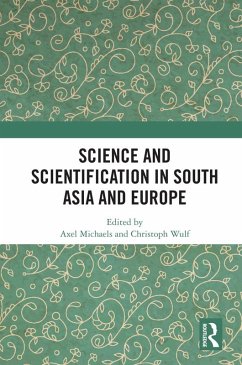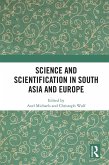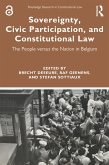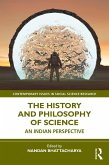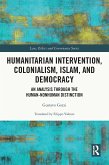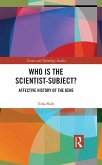Science and Scientification in South Asia and Europe (eBook, PDF)
Redaktion: Michaels, Axel; Wulf, Christoph
41,95 €
41,95 €
inkl. MwSt.
Sofort per Download lieferbar

21 °P sammeln
41,95 €
Als Download kaufen

41,95 €
inkl. MwSt.
Sofort per Download lieferbar

21 °P sammeln
Jetzt verschenken
Alle Infos zum eBook verschenken
41,95 €
inkl. MwSt.
Sofort per Download lieferbar
Alle Infos zum eBook verschenken

21 °P sammeln
Science and Scientification in South Asia and Europe (eBook, PDF)
Redaktion: Michaels, Axel; Wulf, Christoph
- Format: PDF
- Merkliste
- Auf die Merkliste
- Bewerten Bewerten
- Teilen
- Produkt teilen
- Produkterinnerung
- Produkterinnerung

Bitte loggen Sie sich zunächst in Ihr Kundenkonto ein oder registrieren Sie sich bei
bücher.de, um das eBook-Abo tolino select nutzen zu können.
Hier können Sie sich einloggen
Hier können Sie sich einloggen
Sie sind bereits eingeloggt. Klicken Sie auf 2. tolino select Abo, um fortzufahren.

Bitte loggen Sie sich zunächst in Ihr Kundenkonto ein oder registrieren Sie sich bei bücher.de, um das eBook-Abo tolino select nutzen zu können.
This volume critically examines the role of science in the humanities and social sciences. It studies how cultures and societies in South Asia and Europe underwent a transformation with the adoption or adaptation of scientific methods, turning ancient cultural processes and phenomena into an enhanced scientific structure.
- Geräte: PC
- ohne Kopierschutz
- eBook Hilfe
- Größe: 2.05MB
Andere Kunden interessierten sich auch für
![Science and Scientification in South Asia and Europe (eBook, ePUB) Science and Scientification in South Asia and Europe (eBook, ePUB)]() Science and Scientification in South Asia and Europe (eBook, ePUB)41,95 €
Science and Scientification in South Asia and Europe (eBook, ePUB)41,95 €![Sovereignty, Civic Participation, and Constitutional Law (eBook, PDF) Sovereignty, Civic Participation, and Constitutional Law (eBook, PDF)]() Sovereignty, Civic Participation, and Constitutional Law (eBook, PDF)39,95 €
Sovereignty, Civic Participation, and Constitutional Law (eBook, PDF)39,95 €![The History and Philosophy of Science (eBook, PDF) The History and Philosophy of Science (eBook, PDF)]() The History and Philosophy of Science (eBook, PDF)37,95 €
The History and Philosophy of Science (eBook, PDF)37,95 €![Humanitarian Intervention, Colonialism, Islam and Democracy (eBook, PDF) Humanitarian Intervention, Colonialism, Islam and Democracy (eBook, PDF)]() Gustavo GozziHumanitarian Intervention, Colonialism, Islam and Democracy (eBook, PDF)39,95 €
Gustavo GozziHumanitarian Intervention, Colonialism, Islam and Democracy (eBook, PDF)39,95 €![How Rich Should the 1% Be? (eBook, PDF) How Rich Should the 1% Be? (eBook, PDF)]() Nunzio AlìHow Rich Should the 1% Be? (eBook, PDF)37,95 €
Nunzio AlìHow Rich Should the 1% Be? (eBook, PDF)37,95 €![German Nationalism and Indian Political Thought (eBook, PDF) German Nationalism and Indian Political Thought (eBook, PDF)]() Alexei PimenovGerman Nationalism and Indian Political Thought (eBook, PDF)41,95 €
Alexei PimenovGerman Nationalism and Indian Political Thought (eBook, PDF)41,95 €![Who is the Scientist-Subject? (eBook, PDF) Who is the Scientist-Subject? (eBook, PDF)]() Esha ShahWho is the Scientist-Subject? (eBook, PDF)41,95 €
Esha ShahWho is the Scientist-Subject? (eBook, PDF)41,95 €-
-
-
This volume critically examines the role of science in the humanities and social sciences. It studies how cultures and societies in South Asia and Europe underwent a transformation with the adoption or adaptation of scientific methods, turning ancient cultural processes and phenomena into an enhanced scientific structure.
Dieser Download kann aus rechtlichen Gründen nur mit Rechnungsadresse in A, B, BG, CY, CZ, D, DK, EW, E, FIN, F, GR, HR, H, IRL, I, LT, L, LR, M, NL, PL, P, R, S, SLO, SK ausgeliefert werden.
Produktdetails
- Produktdetails
- Verlag: Taylor & Francis
- Seitenzahl: 292
- Erscheinungstermin: 11. März 2020
- Englisch
- ISBN-13: 9781000051797
- Artikelnr.: 58789634
- Verlag: Taylor & Francis
- Seitenzahl: 292
- Erscheinungstermin: 11. März 2020
- Englisch
- ISBN-13: 9781000051797
- Artikelnr.: 58789634
- Herstellerkennzeichnung Die Herstellerinformationen sind derzeit nicht verfügbar.
Axel Michaels is Senior Professor of Classical Indology at the South Asia Institute, University of Heidelberg, Germany. Since 2006, he is Vice President of the Heidelberg Academy of Science and head of the project 'Religious and Legal Documents of Pre-modern Nepal'. His research interests include social history and history of Hinduism, theory of rituals, life cycle rites of passage in Nepal as well as the cultural and legal history of Nepal. He is the author of Homo ritualis. Hindu Rituals and its Significance for Ritual Theory (2016); Hinduism. Past and Present (2004); ¿iva in Trouble. Rituals and Festivals at the Päupatin¿tha temple of Deopatan, Nepal (2008); and Kultur und Geschichte Nepals (2018). Christoph Wulf is Professor of Anthropology and Education at the Freie Universität Berlin, Germany. He is also a member of the Interdisciplinary Centre for Historical Anthropology, the Collaborative Research Centre (SFB, 1999-2012), and the Graduate School 'InterArts' at the Freie Universität Berlin. His books have been translated into 20 languages. He is Vice-President of the German Commission for UNESCO. His research interests include historical and cultural anthropology, educational anthropology, rituals, gestures, imagination, intercultural communication and aesthetics. He has authored and edited various books including (with G. Gebauer) Mimesis: Culture, Art, Society (1995); Anthropology. A Continental Perspective (2013); Human Beings and their Images. Imagination, Mimesis, Imaginary (German edition 2014; English edition in preparation); Exploring Alterity in a Globalized World (2016); (with J. R. Resina) Repetition, Recurrence, Returns: How Cultural Renewal works (2019); and Bildung als Wissen vom Menschen im Anthropozän (2020; English edition in preparation).
Part I: Scientification and Scientism in India Introduction to Part I 1.
The Art of Grammar in Context: 'Science', Human Interest, and the
Construction of Cultural and Political Worlds 2. Sanskrit and Computer
Science 3. Mathematics and Vedic Mathematics 4.The Birth of the (Exorcism)
Clinic: Media, Modernity, and the Jinn 5. The Science Question in
Alternative Agricultures: Zero Budget Natural Farming and the Emergence of
Agronomical Pluralism in India 6. Counting Food? The Pitfalls of Caloric
Conception of Nutrition and Alternative Theories of Food 7. Thinking About
Agriculture in an Industrialising Economy: An Essay Part II: Philosophical
and Anthropological Foundations in the European History of Science
Introduction to Part II: Philosophy, Anthropology and History of the
Humanities 8. The Dominance of Scientific Knowledge and the Devaluation of
Other Forms of Knowledge 9. Modernity, Colonialism and the "Science of
Language" 10. Scientism of Early Modern Age and the Prevailing Scholastic
Discourse on principium individuationis 11. Prolegomenon to the Study of
Science and Religion. A Philosophical and Historical Reflection 12.
Technoscientific Knowledge versus Deep Knowledge 13. Science Cannot Do It
Alone: Habits, Environment, and the Enchantment of Beauty 14. Knowledge and
Science in the Art of Living 15. Transforming Knowledge into Cognitive
Basis of Policies: A Cosmopolitan from Below Approach 16. The Limits of
Science from the Standpoint of Philosophy
The Art of Grammar in Context: 'Science', Human Interest, and the
Construction of Cultural and Political Worlds 2. Sanskrit and Computer
Science 3. Mathematics and Vedic Mathematics 4.The Birth of the (Exorcism)
Clinic: Media, Modernity, and the Jinn 5. The Science Question in
Alternative Agricultures: Zero Budget Natural Farming and the Emergence of
Agronomical Pluralism in India 6. Counting Food? The Pitfalls of Caloric
Conception of Nutrition and Alternative Theories of Food 7. Thinking About
Agriculture in an Industrialising Economy: An Essay Part II: Philosophical
and Anthropological Foundations in the European History of Science
Introduction to Part II: Philosophy, Anthropology and History of the
Humanities 8. The Dominance of Scientific Knowledge and the Devaluation of
Other Forms of Knowledge 9. Modernity, Colonialism and the "Science of
Language" 10. Scientism of Early Modern Age and the Prevailing Scholastic
Discourse on principium individuationis 11. Prolegomenon to the Study of
Science and Religion. A Philosophical and Historical Reflection 12.
Technoscientific Knowledge versus Deep Knowledge 13. Science Cannot Do It
Alone: Habits, Environment, and the Enchantment of Beauty 14. Knowledge and
Science in the Art of Living 15. Transforming Knowledge into Cognitive
Basis of Policies: A Cosmopolitan from Below Approach 16. The Limits of
Science from the Standpoint of Philosophy
Part I: Scientification and Scientism in India Introduction to Part I 1.
The Art of Grammar in Context: 'Science', Human Interest, and the
Construction of Cultural and Political Worlds 2. Sanskrit and Computer
Science 3. Mathematics and Vedic Mathematics 4.The Birth of the (Exorcism)
Clinic: Media, Modernity, and the Jinn 5. The Science Question in
Alternative Agricultures: Zero Budget Natural Farming and the Emergence of
Agronomical Pluralism in India 6. Counting Food? The Pitfalls of Caloric
Conception of Nutrition and Alternative Theories of Food 7. Thinking About
Agriculture in an Industrialising Economy: An Essay Part II: Philosophical
and Anthropological Foundations in the European History of Science
Introduction to Part II: Philosophy, Anthropology and History of the
Humanities 8. The Dominance of Scientific Knowledge and the Devaluation of
Other Forms of Knowledge 9. Modernity, Colonialism and the "Science of
Language" 10. Scientism of Early Modern Age and the Prevailing Scholastic
Discourse on principium individuationis 11. Prolegomenon to the Study of
Science and Religion. A Philosophical and Historical Reflection 12.
Technoscientific Knowledge versus Deep Knowledge 13. Science Cannot Do It
Alone: Habits, Environment, and the Enchantment of Beauty 14. Knowledge and
Science in the Art of Living 15. Transforming Knowledge into Cognitive
Basis of Policies: A Cosmopolitan from Below Approach 16. The Limits of
Science from the Standpoint of Philosophy
The Art of Grammar in Context: 'Science', Human Interest, and the
Construction of Cultural and Political Worlds 2. Sanskrit and Computer
Science 3. Mathematics and Vedic Mathematics 4.The Birth of the (Exorcism)
Clinic: Media, Modernity, and the Jinn 5. The Science Question in
Alternative Agricultures: Zero Budget Natural Farming and the Emergence of
Agronomical Pluralism in India 6. Counting Food? The Pitfalls of Caloric
Conception of Nutrition and Alternative Theories of Food 7. Thinking About
Agriculture in an Industrialising Economy: An Essay Part II: Philosophical
and Anthropological Foundations in the European History of Science
Introduction to Part II: Philosophy, Anthropology and History of the
Humanities 8. The Dominance of Scientific Knowledge and the Devaluation of
Other Forms of Knowledge 9. Modernity, Colonialism and the "Science of
Language" 10. Scientism of Early Modern Age and the Prevailing Scholastic
Discourse on principium individuationis 11. Prolegomenon to the Study of
Science and Religion. A Philosophical and Historical Reflection 12.
Technoscientific Knowledge versus Deep Knowledge 13. Science Cannot Do It
Alone: Habits, Environment, and the Enchantment of Beauty 14. Knowledge and
Science in the Art of Living 15. Transforming Knowledge into Cognitive
Basis of Policies: A Cosmopolitan from Below Approach 16. The Limits of
Science from the Standpoint of Philosophy
